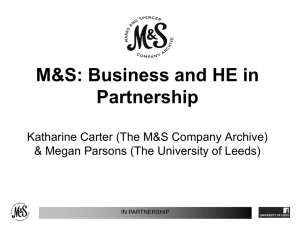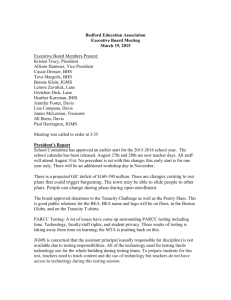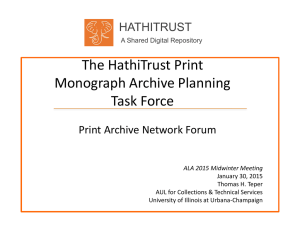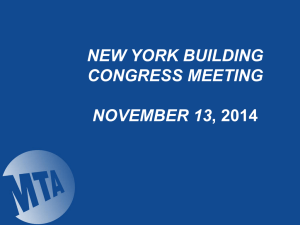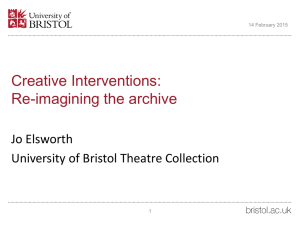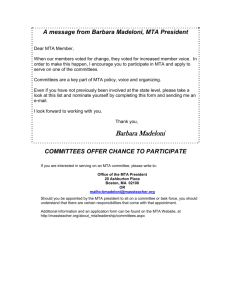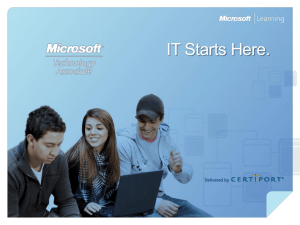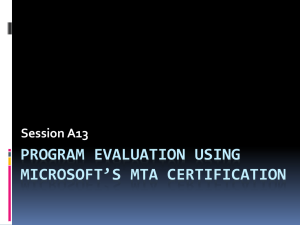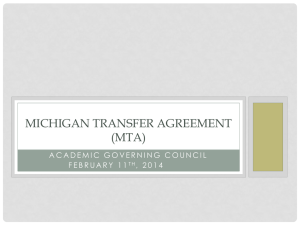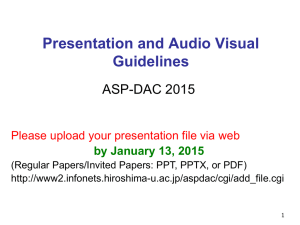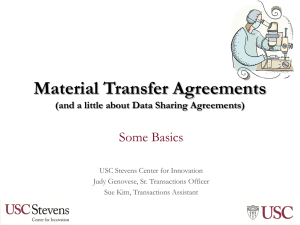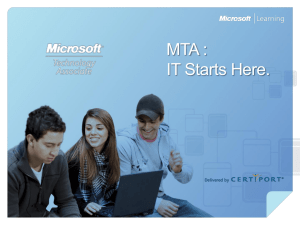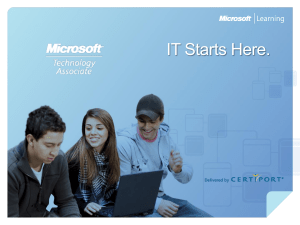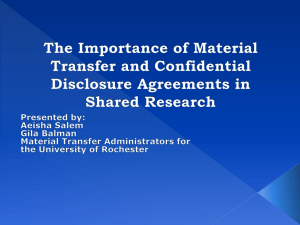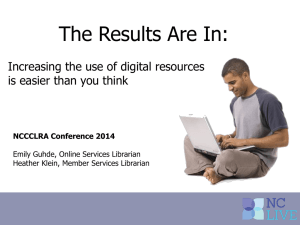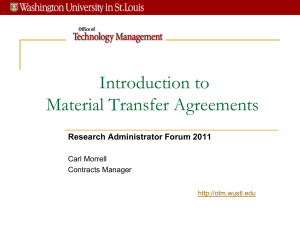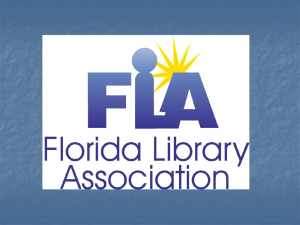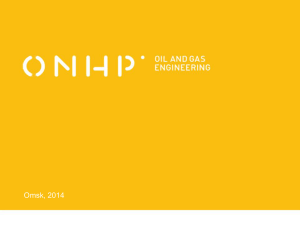PowerpointPresentation
advertisement
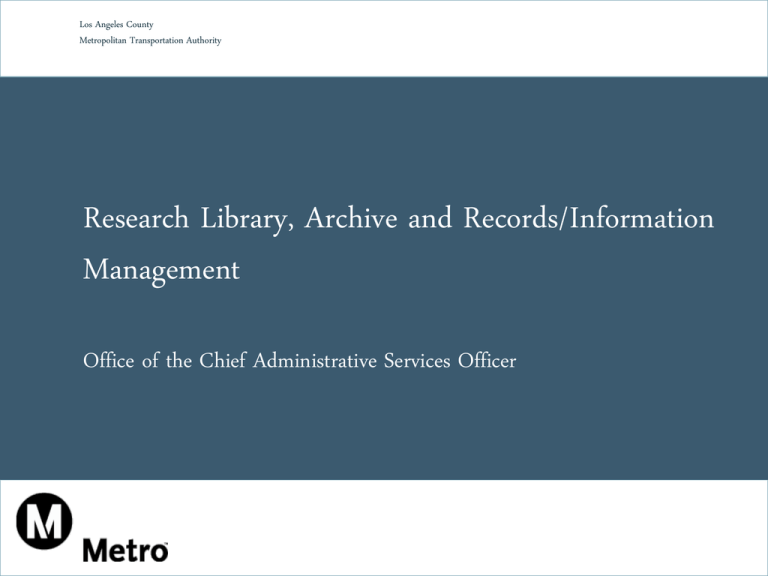
Los Angeles County Metropolitan Transportation Authority Research Library, Archive and Records/Information Management Office of the Chief Administrative Services Officer Research Library, Archive and Records/Information Management Matthew Barrett Policy Research & Library Administrator Library, Archive & Records/Info Mgmt Kenn Bicknell Digital Resources Librarian Transportation Research Library Joe Parise Records & Information Management Mgr. Records & Info Managment Denise Villegas ELTP Archivist Transportation Research Archive & Records Student Interns Circulation Desk Transportation Research Library Research Library, Archive and Records/Information Management Kenn Bicknell Digital Resources Librarian Dorothy Peyton Gray Transportation Library and Archive Denise Villegas ELTP Archivist Preservation, Access, Digitization, Curation & Licensing Student Interns Circulation & Special Projects Research Library, Archive and Records/Information Management Joe Parise Records & Information Mgmt. Manager Records Services NEW Sr. Systems Analyst E-Discovery, ECMS, PRT, Google Search Appliance, Sharepoint & Library Systems David Lor Records & Information Analyst Charlene Williams Records & Information Analyst TCU Records Clerks (3) (Digitization & Metadata) TCU Records Clerk (Offsite Storage Coordination & Metadata) FTE Summary Research Library Administrator 1 Digital Librarian 1 ELTP Archivist Archives Records & Info Mgmt 1 Records Manager 1 Sr. Systems Analyst 1* Records Analyst 2 Records Clerk 4** Summary: 1 Total Requested FTEs 1 Total ELTP/As-Needed Total Staff 2 7 Pre 2009 Staffing 3 10 *requested FTE – Sr. Sys. Analyst **one classified as office asst until retirement Research Library, Archive and Records/Information Management • Research Center – Transportation Research Library • Research library for MTA employees, Board members, consultants, students, government agencies, universities and the general public. • Collection & subscription management, circulation, cataloging, web availability, research guides, FTA repository, engineering specis, references and technical assistance. – MTA Archives • Repository for items of enduring political, economic, legal and cultural value documenting the history and accomplishments of the MTA, its predecessor public agencies, other municipal operators, and the private transportation providers that have operated in Los Angeles since 1873. Research Library, Archive and Records/Information Management • Record and Information Management (RIM) – Operate the Records Management Center. – Ensure compliance with the California Public Records Act and all other applicable state and federal laws governing government agency records. – Perform subpoena research for Counsel. – Manage indexing, off-site storage, and digitization of official records as defined in law and the Gen-8 Policy. – Institute Legal Holds and perform E-Discovery processes on behalf of Counsel. – Audit all cost centers biennially for policy/legal compliance. – Teach monthly classes in Records Management practices for employees. – Promote effective records management processes and manage record life cycles. – Work with the Research Library’s Archive to preserve historic documents, media, and photographs. – Manage indexing & access to Board of Directors records. Research Library, Archive and Records/Information Management • Cost Savings – Research Library, Archives & Records/Info Management provides information to employees faster, better and cheaper than they can for themselves. – Faster by: • Membership in networks of transportation research libraries that collaborate to share information about resources and expedite sharing of resources/services • Developing a well-organized collection of frequentlyneeded, authoritative reference sources and other publications in transportation and other subject areas of interest to the department • Ensuring digital and paper copies of all critical MTA documents are identified, indexed, cataloged, and preserved so any document can be accessed immediately when needed. • Centralizing relevant documents in one location that is easily accessible, including online 24/7. Research Library, Archive and Records/Information Management – Better by: • Developing and applying knowledge about the resources and services of a wide range of publishers and other information providers • Using research staff expertise to access the latest techniques and technologies available to identify, locate and acquire information and information resources • Applying research staff expertise regarding the wide range of formats and methods of distributing and displaying information, laws affecting the use of information and information resources (copyright and other intellectual property law), to provide customers the right information at the right time in the right format. • Providing information more conveniently and easily accessible electronically as well as in print. Research Library, Archive and Records/Information Management – Cheaper by: • Developing and providing services and procedures that allow departmental units and employees to share information resources • Taking advantage of discounts available through various vendors and membership agreements in purchasing and licensing information resources • Organizing and presenting most frequently needed information resources and services on the Internet, Intranet & Social Media sites. • Borrowing needed resources from cooperating libraries in lieu of purchasing rare materials. Why does MTA have a Research Center? • Improved Information Access – Employees who can turn to an information professional for assistance have an advantage. As noted in The Value of Information and Information Services, organizations without libraries spend 2 to 4 times more to acquire information than those with in-house libraries. Obtaining information through use of alternative sources costs 2.3 times as much as acquiring the same information through an in-house library. Part of the cost saving is associated with sharing of resources. If a library owns a document, multiple individuals within an organization can use it. If another library owns it, it can be borrowed. – Federal and state governments invest millions of dollars in research to fuel innovation. Employees and the public need transportation libraries to avoid losing access to the immense amount of research and publications produced by the government, universities, and private companies, especially transportation security information related to buses, light-rail, subways, tunnels, highways, bridges, aviation, and railroads. – Active participation in networks of research libraries that collaborate to expedite sharing of information resources and developing a wellorganized collection of frequently needed, authoritative reference sources in transportation subject areas Why does MTA have a Research Center? • The MTA’s Research Library has existed as an employee research resource and public outreach tool since 1971, its roots are in the original Los Angeles Railway Library that opened in 1895. • It became an FTA repository library, began cataloging its collection into the world catalog, and honoring interlibrary loan requests in 1978. • It continues to be the only comprehensive transportation research center available in all of Southern California. • 40% of the the library’s collection is unique and cannot be found in any other library. • The Research Center functions as the public reading room for Records/Info Management, minimizing California Public Records Requests and allowing the public to search on its own. • For FY13, the Research Library budget represented 0.012% of the MTA budget. Together with Records and Information Management, Cost Center 6440 represents 0.029% of the total agency budget. Why does MTA have a Research Center? • Staff actively works with the Transportation Research Board, the National Transportation Library, the Western Transportation Knowledge Network, the National Transportation Knowledge Network and the Pooled Fund for Transportation Library Connectivity. • Staff also works with peer institutions, APTA, AASHTO, the Special Library Association, the Society of American Archivists, the California Digital Library, USC’s LA as Subject Forum, and the American Records Management Association. • We are the only transit agency participating in the scoping study on a National Strategic Plan for Transportation Information Management. • The Nation’s network of transportation research libraries is supported by a national coordinating library authorized by SAFETEA-LU, under the USDOT’s Research & Innovative Technologies Administration. Title V, Subpart B, Section 5901 – NATIONAL TRANSPORTATION LIBRARY.— • (1) IN GENERAL.—The Director shall establish and maintain a National Transportation Library, which shall contain a collection of statistical and other information needed for transportation decision making at the Federal, State, and local levels. • (2) ACCESS.—The Director shall facilitate and promote access to the Library, with the goal of improving the ability of the transportation community to share information and the ability of the Director to make statistics readily accessible under subsection (c)(5). • (3) COORDINATION.—The Director shall work with other transportation libraries and other transportation information providers, both public and private, to achieve the goal specified in paragraph (2). Why does MTA have a Research Center? • The U.S. DOT’s National Transportation Library selected the MTA’s transportation library as one of 20 nationwide whose outstanding practices, collections and staffing qualify it to be included in a specialized union catalog of transportation libraries. The only other library selected in California was U.C. Berkeley. • In addition to serving the research and technology transfer needs of employees and consultants, the Research Center functions as a passive public affairs service to the general public, providing information and access to public records about projects, policies, and the role of transportation in their communities. How do we compare to other transportation research centers/libraries? California U.C. Berkely Transportation Library LACMTA Transportation Research Library CalTrans Transportation Library (Sacramento) MTC/AMBAG Transportation Library (Oakland) California State Railroad Museum Library (Sacramento) San Francisco Muni Library South Coast Area Transit Library (Oxnard) MTDB Library (San Diego) Mineta Transportation Research Library (San Jose) BART Technical Resources Library Librarians 5 2 4 2 2 1 0.5 2 1 1 Collection Date Size Established 496,000 1948 200,000 1971 170,000 1940 24,000 1970 10,000 1981 5,500 1975 2,000 1979 1,500 1985 1,000 1991 6,000 1976 Budget for Books & Annual Periodicals Circulation $ 49,000 52,197 $ 55,000 5,500 $ 38,000 3,600 $ 45,000 350 $ 15,000 5,000 $ 1,100 25 as-needed non-circ project related non-circ 1 1 n/a n/a Other States Northwestern Transportation Library (Chicago) 4 236,549 UMTRI - University of Michigan Transportation Institute 3 95,000 NY MTA Bridge/Tunnel Technical Library 1 54,000 Minnesota DOT Transportation Library 5 35,000 Arizona Transportation Research Library 1 28,000 Michigan DOT Transportation Library 1 26,000 King County Metro Transportation Library (Seattle) 3 14,000 Portland Trimet Transportation Library 2 6,000 American Public Transit Association 2 5,000 Metro Houston Transportation Library 1 1. Institute is part of San Jose State Business School, separate stats not kept. 1955 1966 1991 1957 1990 1964 1972 1975 1915 1988 $ $ $ $ $ $ $ $ $ 162,000 30,000 13,000 80,000 17,000 75,000 25,000 22,500 64,000 11,233 1,200 3,900 400 330 500 non-circ Paper circulation only. MTA’s electronic circulation is much higher. Key Performance Indicators (KPIs) 1. Percent of newly-acquired research materials catalogued and made available within 5 days of receipt. 2. Percent of reference and research questions answered within 48 hours. 3. Percent of California Public Records Requests responded to within 10 days. 4. Number of pages digitized. 5. Percentage of box storage decreased. 6. Percent of biennial Cost Center Records Management Audits Completed. 7. Average Records Management Class Participants class effectiveness rating. FY13 Accomplishments 1. Percent of newly-acquired research materials catalogued and made available within 5 days of receipt. 95% 2. Percent of reference and research questions answered within 48 hours. 99% 3. Percent of California Public Records Requests responded to within 10 days. 4. Number of pages digitized. 5. Percentage of box storage decreased. 6. Percent of biennial Cost Center Records Management Audits Completed. 7. Average Records Management Class Participants class effectiveness rating. FY14 Goals Percent of newly-acquired research materials catalogued and made available within 5 days of receipt. 100% Percent of reference and research questions answered within 48 hours. 100% Percent of California Public Records Requests responded to within 10 days. 100% Number of pages digitized. Percentage of box storage decreased. Percent of biennial Cost Center Records Management Audits Completed. Average Records Management Class Participants class effectiveness rating. 3% 100% 5 out of 5
